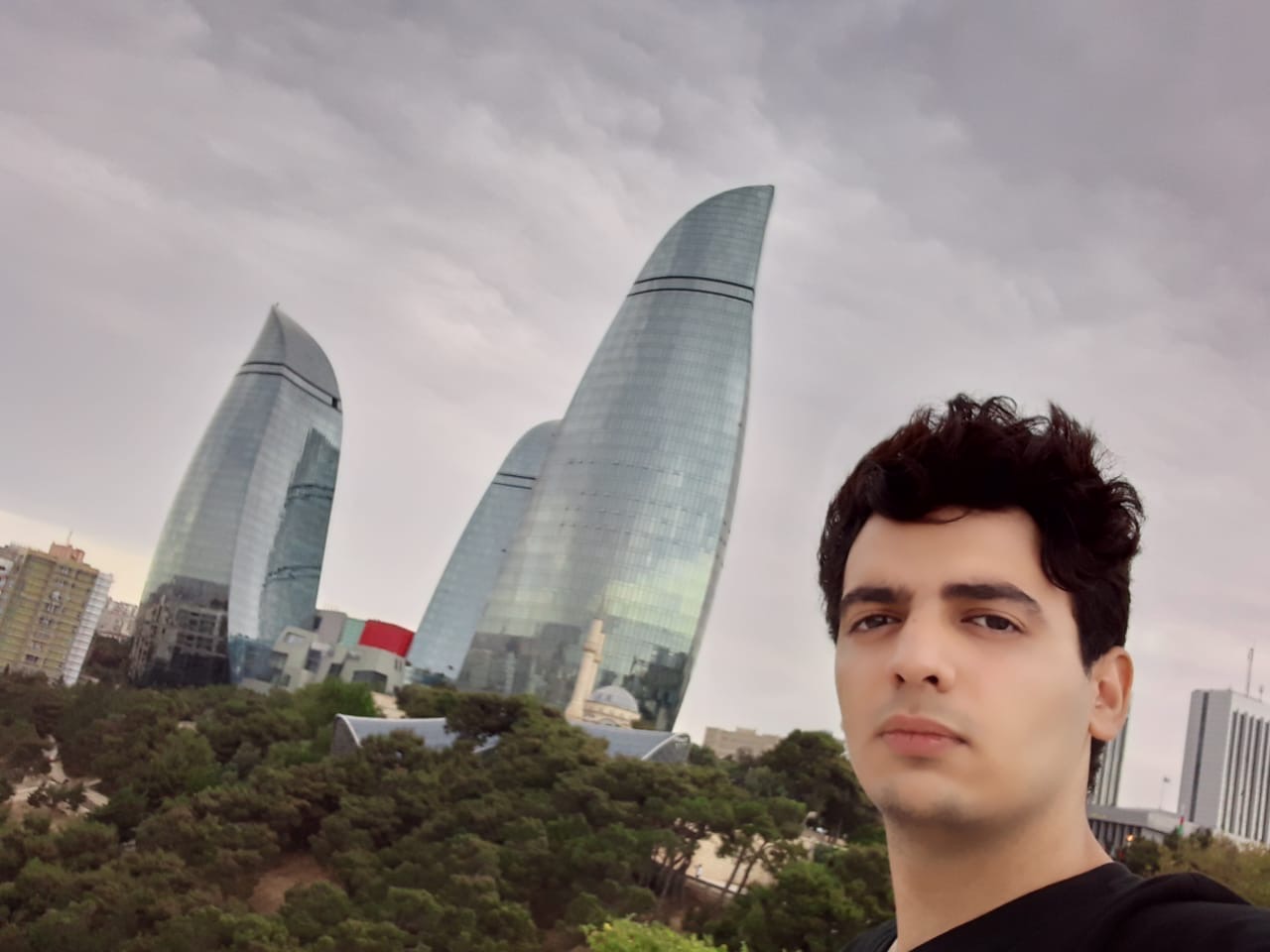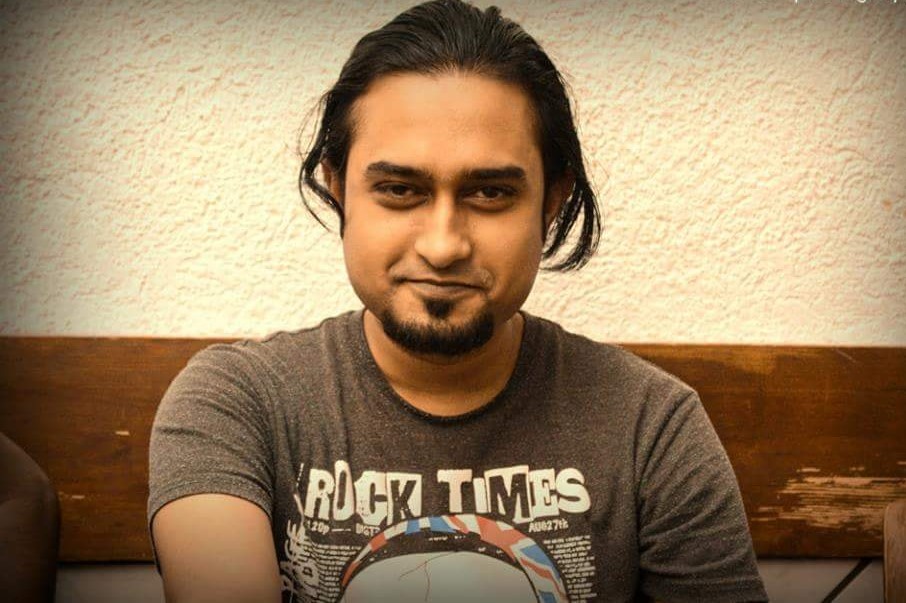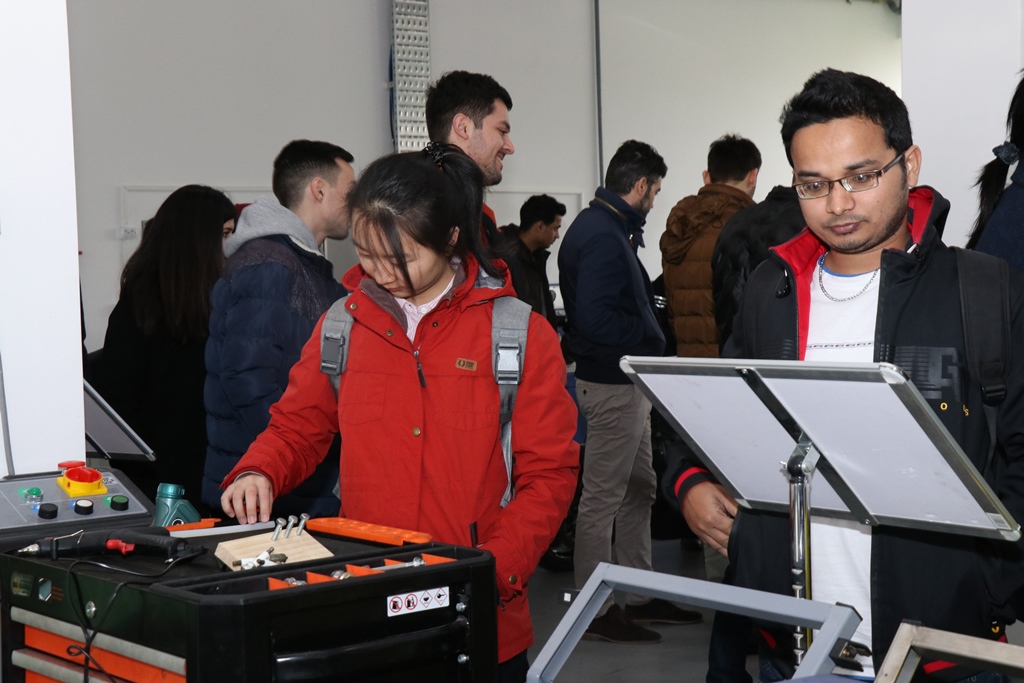
Mohammadreza Navab Motlagh Amir, an international student from Iran who studies foundation program at Baku Music Academy named after Uzeyir Hajibayli, shares his main challenges about the COVID-19 and describes how quarantine period affects his student life. 1. When and how did you receive the news about coronavirus? What was your first reaction? I learned about the coronavirus from the news, I did not worry so much, and I didn't think that it would be such a big problem. 2. Was it your decision to stay in Azerbaijan during pandemic time or it was too late to leave the country? (If yes, why?) It was my own decision to stay in Azerbaijan to be able to continue my lessons. I even had a chance to go back to my country during a pandemic, but I decided to stay and keep studying. 3. Your life in Azerbaijan during the pandemic. Of course, life got harder everywhere in the world during the pandemic, and there was no difference. But I think the government of Azerbaijan handled the problem well. And the most important thing was that I felt safe because both government and the people of Azerbaijan tried to fight this virus by keeping the streets and public places solitude. I stayed at home most of this time and had my online lessons and once in a while, I went shopping by getting permission. 4. Does your university supply you with online classes? Do you attend the online classes? What are advantages and disadvantages of online classes Yes, I had online classes during this time. Of course, normal classes are much better than online, especially for the fortepiano lessons. But it was really good that I still had the opportunity to work on my lessons with online classes. It's better to have online classes than no classes at all. And the teachers of Academy acted very responsibly at this time and that was a real satisfaction. 5. Coronavirus: the pros and cons of keeping universities closed. I think that whenever the government feels that it is safe to open universities they should be opened because it would help the morale of the students but only in the case of completely safe and under control. 6. How do you spend your time now? Has anything changed in your daily routine? Hobbies before and during COVID-19 Of course, my daily routine changed during the quarantine. I still do my practices and study, but I don't go out as I used to do. I started to read more books and be more active in social media, and my sleep routine also changed in a period, but I fixed it again. 7. Did you try to learn something new or discover your new skills during lockdown? (yoga, studying new languages...) I tried to work on my Russian language, but then I got busy with online classes. 8. What lesson have you learned from this pandemic? Please express Advantages and disadvantages of this situation During this time, I've learned that how social creatures we are and how we are helpless without each other and how we need and affect each other. Besides, we should love and help each other more and be kind to each other and value the moment that we are together. I've learned that it doesn't matter that what is our color or country or anything else, we are all humans and we should act kinder and help each other. 9. Comparison of the lockdown in home and host countries. In a simple comparison between my home and host countries at this time, my home country has much more population than Azerbaijan so it was really harder to control the situation there as Iran is a much bigger and more populated country. The most important thing was that most of the people in both countries tried to stay at home and be careful and I think that's the biggest help. Also, doctors and nurses of both countries risked their lives to fight the virus and it was a very brave and beautiful action of them. 10. Your communication circle during the quarantine. My communication circle during the quarantine was online communication with my teachers here, my friends, and my family in Iran. And 2 or 3 of my friends are here too.
Show more
Shashwata Roy, an international student from Bangladesh who studies foundation program at Azerbaijan Technology University shares his main challenges about the coronavirus and describes how he spend his student life during quarantine days. 1. When and how did you receive the news about coronavirus? What was your first reaction? The first we learned about Corona virus from online news portals. In the beginning, we thought that about ninety per cent of these fear was just online hoax and it was not going to be as much dangerous as a pandemic. 2. Was it your decision to stay in Azerbaijan during the pandemic time or it was too late to leave the country? (if yes, why?) It was too late to leave Azerbaijan and fly to our homeland. Because when we understood about its outbreak, then all flights had already been cancelled indefinitely. 3. Your life in Azerbaijan during the pandemic. We assumed that our life might be very difficult in Azerbaijan during the pandemic. Because all of our family members became jobless and it was quite impossible to bring our living expenses as well as the tuition fee to Azerbaijan. But our university continuously helped us financially in these cases. 4. Does your university supply you with online classes? Do you attend the online classes? What are the advantages and disadvantages of online classes? Yes, our university supplies us with online classes and every time we attend our lessons attentively. Although online classes are interesting and obviously a new experience for us, this system has some disadvantages. Especially for some foreign students like us. The first one is, we don't have any computer in our dormitory to participate lessons perfectly. We depend on mobile phones and these devices are not enough for understanding the speeches and presentations of our teachers clearly. Sometimes internet speed falls off during the lesson because of bad weather. Then it feels irritating. Secondly, we face some problems in the question-answer part of our classes, it seems like a sound pollution when many students speak together. We strongly believe that we could have learned better if we would have attended classes directly at the university. 5. Coronavirus: the pros and cons of keeping universities closed. Since surviving at any cost is the most significant necessity and right for human being and obviously it is more essential than education and any other thing, keeping universities closed is the best decision from the government. Actually nobody has any other choice. 6. How do you spend your time now? Has anything changed in your daily routine? Hobbies before and during COVID-19. We spend most of our time browsing internet, writing articles in several portals. Besides, we cook foods twice a day and also walk inside our hostel's territory. Before, we used to go jogging everyday all over the city. Sometimes we would go to tea-stalls. But during this lockdown period these habits of ours have changed. 7. Did you try to learn something new or discover your new skills during a lockdown (yoga, studying new languages, etc.)? I have improved my skill of essay writing regarding various topics and sometimes we try to practice singing together. Of course we aren't professional. But it mitigates our stress. Also this lockdown is a good opportunity to improve our thinking capability. 8. What lesson have you learned from this pandemic? Please express the advantages and disadvantages of this situation. Although in reality, every relationship looks like a business transaction, but from this pandemic we have to learn that the world must emerge humanity and start to love and help each other unconditionally. Enhancement of domestic violence during the lockdown indicates that we are not really so tolerant, patient and gentle as we pretend to be. It is the time to measure the quantity of atrocity that we contain in our subconscious mind. In my opinion, nationalism is a misconception created from imagined reality. So both of Nationalism and Capitalism must be collapsed. We should learn the real definition of happiness as I can feel now what Alanis Obomsawin said. Humans can't survive eating money. 9. Comparison of the lockdown in home and host countries. Since we are Bangladeshi, our home country is Bangladesh. Our government has also locked down the whole land like Azerbaijan. It's still going on in Bangladesh. Nevertheless, people are getting infected and dying. Because there are about 180 million people live in a very small territory. So Resisting the spread is a tough job there. The government is also helpless. Because it's almost impossible to provide all the people with foodstuffs, when the farms, offices and transportation systems are closed. 10. Your communication circle during the quarantine. We always communicate with our family and friends via social media and phone. The rest time we keep connection with our teachers here. Besides, a security personnel is 24/7 there for us.
Show more
Foreign students who study at Azerbaijan Technical University (ATU) are taking an internship at Baku State Vocational Education Center for Industry and Innovation which is based on Korean professional education standards. A number of technicians are trained in the Center in various fields such as web-design, electric, car repair screwdriver, technical inspector of vehicle condition, repair and service of computers. Tural Goyushov, the teacher of the Center, and other trainers gave detailed information to the delegation members about principles and safety labor activities of technical equipment. Orkhan Rahimov, the deputy director of the Center, said that there are vacancies in the Center in accordance with relevant majors for the educated people with good command of English.
Show more
The Ministry of Education of the Republic of Azerbaijan organized the event "Memorial stories of Khojaly Genocide" dedicated to the 28th anniversary of the Khojaly Genocide on 24th February. Narmin Ibrahimova who born in Khojaly and Gulmammad Mammadov Ph.D at Syracuse University shared their memories regarding the genocide. About 100 foreign students participated in the event from various universities. We would like to invite you to watch the records from the event. Please click the link to watch: https://edu.gov.az/az/page/9/18019
Show more



